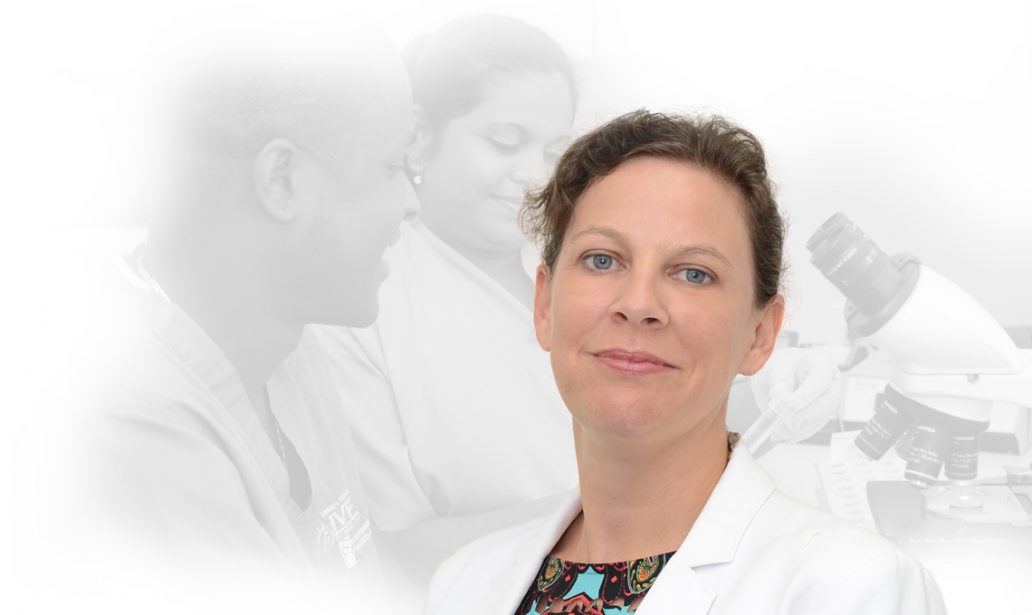For those who long for parenthood, being unable to conceive can be devastating.
“There is a common misconception that fertility issues mainly have to do with the ‘career woman’ who waits until later in life to try to have a baby, but in reality, these issues can happen at any age, and with both sexes,” says Dr. Catherine Minto-Bain.
Dr. Catherine Minto-Bain, MB, ChB, MRCOG, is a fertility specialist and the Medical Director of Trinidad & Tobago IVF & Fertility Centre, located in Maraval, north-west Trinidad. The Centre also has a unit at Medical Associates Hospital in St. Joseph.
The Centre offers a complete fertility service including investigations, counselling and treatment. It is the only one of its kind in operation in Trinidad and Tobago, and is the leading fertility clinic in the Caribbean. Some of its key milestones include:
Dispel fertility myths- 2012: Caribbean’s First Sperm Bank
- 2007: Caribbean’s first laser assisted pregnancy
- 2006: Caribbean’s First Assisted Hatching Programme
- 2006: Caribbean’s First Blastocyst Transfer
- 2001: Caribbean’s First Egg Donor Baby
- 2000: Caribbean’s First Frozen Embryo Baby
- 2000: Caribbean’s First IVF Twins
- 1998: Caribbean’s First PESA Pregnancy
- 1998: Caribbean’s First ICSI Baby & Twins
- 1997: Caribbean’s First IVF Baby
- 1996: Caribbean’s First IUI Pregnancy
The Centre was also the first in the Caribbean to launch an IVF with donor sperm programme, an egg sharing programme, an elective single embryo transfer programme, and a reproductive tourism programme.
Beyond these achievements, another of its goals is to improve public knowledge and awareness to dispel fertility myths and promote healthier lifestyles for those who wish to become parents.
Possibility: the field of fertility
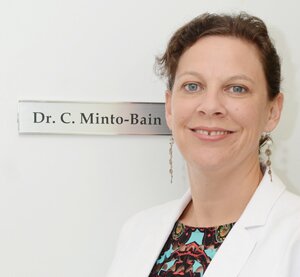
From a young age, Dr. Minto-Bain had a keen interest in medicine, as she saw it as a way to blend arts and sciences, while also being able to help others.
Today, she specialises in fertility treatments and transvaginal ultrasound work, and has many research publications in the field of reproductive endocrinology. She also lectures in Obstetrics and Gynaecology at The University of the West Indies (UWI) Medical School.
“I wasn’t attracted to fertility as a specialty at first,” she admits.
The forefront of new scientific advances“But as I matured in my career, my work put me at the forefront of new scientific advances: Pre-implantation Genetic Diagnosis (PGD), which is now a routine part of In Vitro Fertilisation (IVF); gene therapy in sheep, premature ovarian failure, and much more. I saw that fertility is a rapidly changing field, and I became more and more excited at all the possibilities.”
While attending university in her homeland of England, she met her husband, who is a Trinidadian; and after several years working at major teaching hospitals in London, she and her husband emigrated to Trinidad, where she joined Professor Samuel Ramsewak, MB, BS, FRCOG, FACOG, MD, her partner at the T&T IVF & Fertility Centre.

“We have been able to put the protocols and structures in place to provide a service level in Trinidad that is on par with any first world country,” states Dr. Minto-Bain, noting that the Centre received UK accreditation in January 2012.
On par with any first world countrySince the opening at its location in Maraval in 2010, its staff complement grew from four members to 17 — three fertility doctors, two fertility counsellors, three embryologists, six nurses (one of whom is also a nutritionist), and three administrative staff.
They practice a holistic approach to patient care, and non-medical staff members are trained to serve as a first point of contact to provide useful information and guidance to patients.
Ethics & Legal Considerations
Despite the lack of regulation in Trinidad and Tobago to address fertility issues, in order to maintain its UK accreditation the Centre has to uphold the guidelines and practices that would apply in the United Kingdom — one of the most regulated fertility environments in the world.
The Centre is also guided by its Ethics Committee, which is dedicated to protecting the welfare of all children produced.
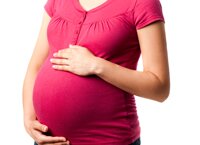
“For instance, if the woman is 52 and over, we do not offer fertility treatment,” says Dr. Minto-Bain. “Childbearing could cause harm to the woman’s body; but more importantly, we are concerned with the welfare of the child she may create. We believe that is unfair to produce a child that is likely to be orphaned at a young age.”
Another key practice upheld by the Ethics Committee is to deny requests for selective qualities.
“We do not choose the gender, nor do we select physical traits of a child like hair or eye colour,” she states. “Also, while there is a small possibility of multiple births from some types of treatments, we do not create this on request.”
The Centre offers treatment to lesbians via donor sperm; however, they do not provide services for those requiring surrogacy — in this case, the lack of regulation becomes a serious impediment.
Encourage that openness and start the debate“Based on our adoption laws, a couple that has a child via a surrogate may not legally be able to get their child,” she explains.
Through social media such as Facebook, the Centre brings these issues to light, seeking public opinion that they hope may one day be able to influence change at a regulatory level.
“We’re not saying it is right or wrong,” adds Dr. Minto-Bain. “But surrogacy takes place and is well regulated in other countries. As the country leader of the Caribbean region in terms of fertility, is it important for us to at least encourage that openness and start the debate.”
At the Clinic: What to Expect
In general, fertility tests and treatment are recommended for couples that have not achieved a pregnancy after at least one year (as defined by the World Health Organisation). If you have been trying for over a year and the test results are normal, it is likely that you will be encouraged to continue trying for a while longer before embarking upon fertility treatments. However if you are over 35, or if your test results are abnormal, you would be advised to have further tests or start fertility treatment.
Recommended for couples that have not achieved a pregnancy after at least one year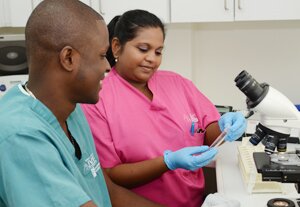
Tests will be conducted to determine possible causes of infertility, and a recommended approach for a course of fertility treatment(s) will be provided.
The doctor will usually request to examine the female partner first and perform a transvaginal pelvic ultrasound scan to check the health of the womb, ovaries and pelvic area. If she has not had a cervical PAP smear within the last three (3) years, this may also be done at this stage.
Women will be asked to take blood tests to check the number of eggs they have (AMH), whether they are making and releasing eggs (ovulating) and to check the levels of hormones that control their menstrual cycle.
For men, a detailed sperm analysis by qualified andrologists and embryologists is required. This evaluates the number of sperm being produced, how well they swim, whether they are healthy or may be compromised by antibodies, infection, other cells or problems with the semen fluid.
These tests guide the fertility specialists to recommend the most appropriate fertility treatment from the various options available, which include:
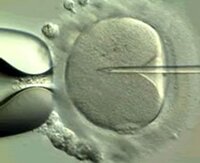
- Fertility drugs that encourage egg development and ovulation
- Surgery to remove endometriosis or scar tissue
- Laparoscopic surgery to treat polycystic ovary syndrome
- Surgery to remove fibroids
- Artificial insemination with sperm (IUI)
- In Vitro Fertilisation or IVF (test tube babies)
- ICSI (sperm injection IVF)
- Donor egg or donor sperm treatment
- Sperm freezing
- Egg freezing
- Egg and embryo freezing by vitrification
Find out more about common fertility treatments here.
Fertility Treatment – does it work?
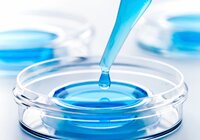 Dr. Minto-Bain notes that the public doubt and skepticism about fertility clinics often emerge because treatments are expensive and cannot guarantee a pregnancy.
Dr. Minto-Bain notes that the public doubt and skepticism about fertility clinics often emerge because treatments are expensive and cannot guarantee a pregnancy.
While there is no circumventing this fact, it is important for the public to be advised of the past success rates and likelihood of pregnancy based on age and other factors. The table below outlines the Centre’s recent success rates.
| T&T IVF & Fertility Centre IUI Success Rates |
2012 | 2013 |
|---|---|---|
| Number of IUIs performed (all types) | 114 | 109 |
| Pregnancy rate in all women (18-45 years) | 18% | 17% |
| Pregnancy rate in women 32 years and under | 19% | 26% |
| Pregnancy rate (donor sperm) | 33% | 29% |
| Multiple pregnancy rate (twins) | 3% | 3% |
| Multiple pregnancy rates (triplets or higher) | 0% | 0% |
For those who may be financially challenged, egg sharing can assist to bring down the cost of fertility treatments. This means that the woman can donate some of her eggs from an IVF cycle to another couple that does not have eggs, which will significantly lower her own cost.
Another point to consider is that many people may not need fertility treatment, but can benefit from advice on nutrition, health and exercise that may in turn effect the necessary changes in their bodies to improve their chances at becoming pregnant.
“We would often explain ovulation to some couples, guiding them as to the best time to have sex; or we may recommend for someone to change their lifestyle in terms of losing weight or stopping smoking,” says Dr. Minto-Bain.
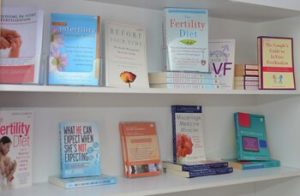
“We also do relationship counselling, and coach patients in anxiety reduction techniques. We cannot treat fertility issues in isolation — fertility is your entire body.”
Fertility is your entire bodyShe adds that not everyone is encouraged to get fertility treatment; based on the outcome of tests done, some patients may be guided to the Adoption Board rather than spending a large amount of money on a slim possibility of a chance.
“If someone really wants a child and it is unlikely they will have one naturally or with our expertise, it is still possible to have a family by adoption,” she says. “We want to make sure everyone fully understands their options — the focus is not for us to make profit but to make families.”
Setting standards & guidelines
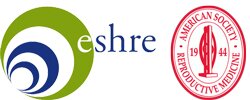
In 2013, the T&T IVF & Fertility Centre held the first Caribbean Symposium on fertility. The Symposium will be held again in May 2015, and will feature andrologists (sperm medicine experts) from around the world.
The Centre is affiliated with The Gynaecology & Obstetrics Association of Trinidad and Tobago, the European Society of Human Reproduction & Embryology, and the American Society of Reproductive Medicine; and is also linked with other fertility clinics in the region.
Through these partnerships and associations, they continue to share information and build on the growing knowledge and expertise in the region and throughout the world.
One of the topics featured in the earlier symposium, which will be discussed again in the upcoming event in May, is the importance of setting standards for semen analysis and procedures for treating with donor sperm.
Avoid causing harm to persons seeking fertility treatmentsAs fertility practices are unregulated in the Caribbean, it is crucial for the region to be aware of worldwide practices and scientific advances to avoid causing harm to persons seeking fertility treatments.
For instance, fresh sperm donations are illegal in many countries as they can transmit diseases including HIV, hepatitis C, hepatitis B, and syphilis; only frozen sperm which has been quarantined and tested and is thus safe for insemination is used. Also, physicians may advise men to use testosterone supplements to boost sperm performance — in reality, this causes an opposite effect.
“Many things can affect fertility, and there are a lot of misconceptions and outdated practices that can negatively impact someone’s fertility,” explains Dr. Minto-Bain. “Part of our role at the Centre is to spread awareness, which we continue to do through our conferences and our training of medical staff in the country and throughout the region.”

The Centre welcomes interested persons to contact them if they are interested in donating. All donors must undergo a rigorous screening programme to ensure that the highest quality specimen is chosen for the future parent(s).
“Having worked in the UK, I am amazed at the willingness of persons here in Trinidad who will become donors out of the goodness of their hearts,” says Dr. Minto-Bain.
“I have seen here in T&T that there is genuine compassion in giving to others who are not as fortunate — a real belief in children, and in family.”
Further Information
- The first visit with the nurse is free, and the Centre strongly believes in giving as much information as possible for those trying to become pregnant.
- If you are a woman who wants a baby on your own, you can have fertility treatments with donor sperm. However the Centre will require you to meet with their counselors, and discuss what it would mean to become a single parent. You should also have a good support system so as to ensure that your child will be taken care of in case of your severe illness or death.
- If you a man who is considering becoming a sperm donor, you will be required to visit the Centre several times before being able to donate your sperm, in order to conduct several tests. Note the following requirements:
- You should be between the ages of 20-49 years
- You must be a non-smoker for at least three months prior
- You cannot be a user of marijuana
- You will be required to do a urine test to ensure there are no drugs in your system
- You will not be accepted if you have sickle cell disease or epilepsy
- You must be of a healthy weight in accordance to your height
- You will be required to undergo a psychiatric evaluation

